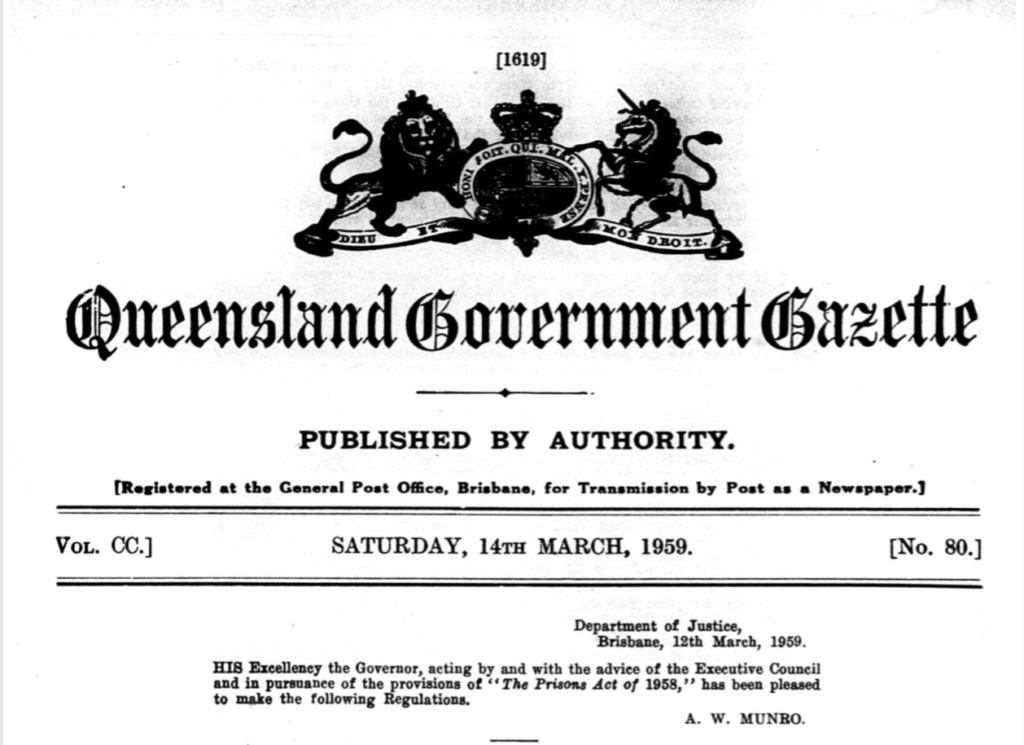BOGGO S2 E8 – Rules and Regs – Treatment, Discipline and Conduct
- On : 21 March, 2019
- By : Boggo Road Gaol
- Category : Stories
- View : 3111
BOGGO S2 E8 – Rules and Regs – Treatment, Discipline and Conduct
In 1959 a new Prisons Act came into force. Sweeping away out of date procedures, clarifying roles and improving prisoner’s rights. The act laid out clearly punishments and the powers of prison officers. Every officer was expected to know the regulations like the back of his hand. Part 12 of the Regulations – Treatment, Discipline and Conduct of Prisoners would form the crucial foundation that would determine the day to day management in the prison. The rules and regs would decide what prisoners and officers could and couldn’t do…
Formally gazetted on the 14th of March 1959, the new Prisons Act would replace the far out-dated 1890 Act. The Prisons Act is an essential piece of legislation that governs how prisons and places of punishment in the state are managed. It governs what the prisoners and the prisons officers can do and what they were not permitted to do under any circumstances.
By 1957, it was very clear that the old regulations had well and truly passed their usefulness. In February 1957, Boggo Road Gaol was overcrowded, and trouble was at fever pitch. Young men locked up in cramped conditions- sometimes three to a cell were increasingly rebelling.
Fever strikes again
At 8AM on Saturday, 2nd February 1957, two prisoners, Potter and Gallagher broke from the morning muster and climbed up onto the roof of C Wing Cellblock. As their feet burned on the hot corrugated iron, they shouted their demands.
We want a public inquiry. We aren’t animals. We can’t eat the food. You ask for better conditions and what happens – the stick you in the black dungeon….
This was not the only trouble at this time, but perhaps it was the one that garnished the most attention. Two weeks later as a result of the inquiry that was the subject of the prisoners demands heads rolled at Boggo Road.
Superintendent William O’Connor who citing ill health requested to be relieved of his post. After having controlled Brisbane Prison for 17 years, O’Connor would remain in the prison service as Chief Warder until 1965.
Deputy Comptroller-General Stewart Kerr was appointed Acting Superintendent of Brisbane Jail until a replacement could be found. Comptroller- General Mr. W. Rutherford was moved sideways to State Migration Officer. Rutherford had been in the role nine years, since 1948.
Stewart Kerr was appointed Comptroller-General of Prisons on the 21st of November 1957, determined to improve the situation in Queensland’s prisons. In a radical departure from tradition, Kerr personally attended Brisbane Prison every week and was present during roll-call. Any prisoner could raise his hand and request to speak to the C.G. To raise matters of concern without fear of recrimination. It was unheard of.
Re-writing the Rules
Stewart Kerr, a steely-eyed former detective sat with his wife, personally hand crafting the new act with a typewriter at his kitchen table. He knew every line of the 1890 act and the regulations, and he knew it needed desperate rewriting. In 1959 the new Prisons Act of 1958 and Regulations was enacted repealing the old Prisons Act of 1890 and Regulations – 70 long years after the last major overhaul.
In every cell, every prisoner had a copy of the regulations. It was more often than not the only reading material allowed. When the new regulations were released in 1959, they replaced the very well used 1890 regulations. A crisp new copy was placed in every cell and would remain there until the Kennedy inquiry nearly thirty years later.
Just as before, officers were expected to know the Act and the Regulations like the back of their hand. The prisoners too, would benefit from knowing the regulations … it will allow them to know the rules and of course how to break them!
In this episode of BOGGO, Gaol Director Jack Sim and Research Coordinator discuss some of the interesting regulations of the 1959 Act, as they pertain to the Treatment, Discipline and Conduct of prisoners (and officers). More importantly, the effect that these changes would have made to officers and prisoners alike.

